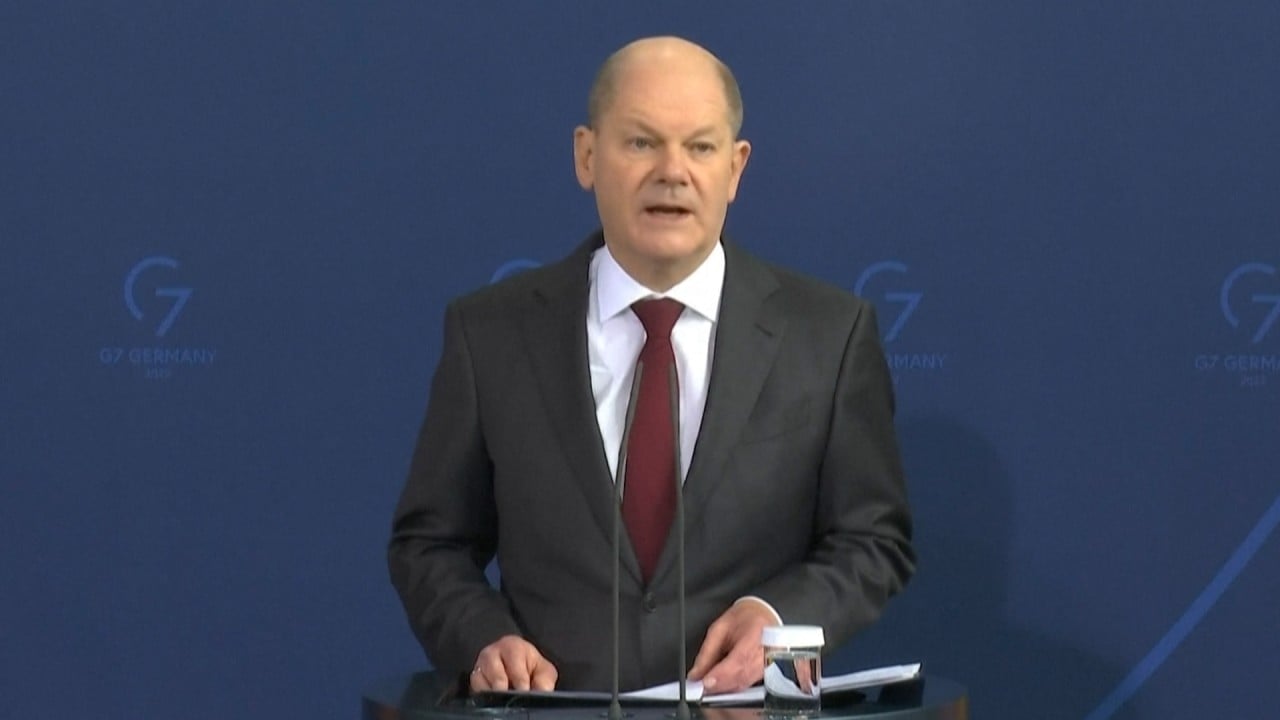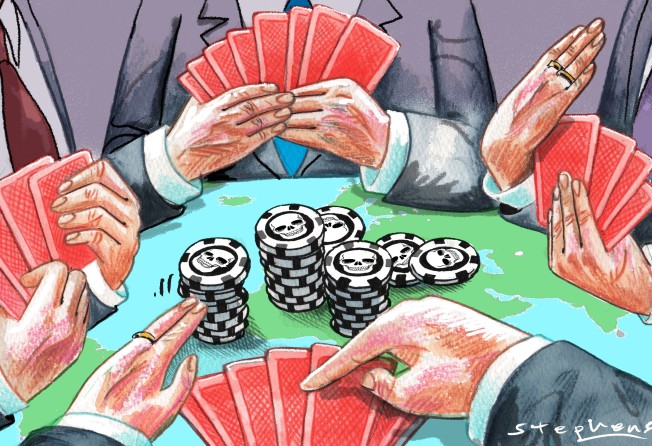
00:45
German Chancellor Olaf Scholz halts Nord Stream 2 gas pipeline after Russia’s actions

The spectre of armies shifting positions and moving into place on distant sides of the world, and of diplomats crafting statements and shuttling about, invokes images from the last century. The idea of Europe in flames, Asia in danger and the Middle East seething suggests a perpetual state of global crisis while the players contemplate their next moves.
Russian forces gnawing at Ukraine on land, at sea and in the air give the appearance of wild animals hovering over their prey. And the forces opposing them, not just Ukraine but all the member states of Nato, are sounding like angry beasts breathing defiance but not quite ready to risk getting mauled or killed.
The analogy of a card game may work better as cagey leaders wonder how much to lose or gain from a stand-off that could get a whole lot worse than the entry of Russian troops into Ukraine’s southeastern Donbas region and artillery barrages and feints along Ukraine’s frontier with Russia and its quasi-satellite, Belarus.
Russian President Vladimir Putin, holding the cards on his side, can count on Belarusian dictator Alexander Lukashenko, his only real friend among all the East European countries that broke off from the old Soviet Union 30-plus years ago.
On their side, the leaders of the 30 member states of the North Atlantic Treaty Organization by no means think alike, despite protestations to the contrary.
The Germans worry about their relations with Russia, from which they still buy natural gas piped through Ukraine to heat millions of homes and offices. They had wanted to buy natural gas via a new pipeline but finally refused to certify the project long after the United States had warned against it.
And who would have imagined that Turkey, under President Recep Tayyip Erdogan and cozying up to Russia, would be rushing to Ukraine’s defence?
The overriding consideration of all the players is that no one wants to shed blood for Ukraine, and Putin knows it. US President Joe Biden’s decision to send a few thousand more American troops to Europe is not going to deflect upwards of 190,000 Russians menacing Ukraine.
Inside Ukraine, the spectacle of aggrieved citizens buying rifles and vowing to stand up to the Russians conjures up images of the slaughter of millions.
The game is played worldwide, nowhere more assiduously than in Northeast Asia. China and Japan are careful not to show their real hands beneath rhetoric, diplomatic posturing and alarming movements of planes and ships.
Chinese President Xi Jinping has to be watching carefully for weakening inside Nato while also eyeing the Russians, who he can never trust despite the show of goodwill between him and Putin in their long conversation before the opening of the Beijing Winter Olympics.
North Korean leader Kim Jong-un has his own hand to play. Having held off test-firing missiles during the Beijing Olympics, to avoid upsetting China, he is now free to resume testing. He knows the US, focusing on Ukraine, won’t do anything to stop him. Even if he orders the test-firing of an intercontinental ballistic missile, the Americans would only call for more UN sanctions, which China and Russia would veto.
In the Great Game, Beijing is sure to intensify pressure on Taiwan, but Xi is not about to risk armed conflict right away.
Still, if real war breaks out in eastern Europe, he could see the timing as propitious for advances everywhere around China’s periphery, including the South China Sea, and China’s frontier with India and Pakistan.
Beijing’s Belt and Road Initiative calls for a highway linking China across the Himalayas to Pakistan’s port of Gwadar in the Arabian Sea and on to Europe. It’s a spectacular project that’s drawing former US ally Pakistan firmly into China’s orbit while Washington counters by tightening ties with Pakistan’s arch-foe India.
The US has other cards to play. Biden and his team have hinted at all sorts of reprisals, ranging from cutting off Russia’s access to markets to drastic sanctions. British Prime Minister Boris Johnson has indicated he would stop Russian oligarchs from wheeling and dealing in British property and companies, as they have been doing with increasing zeal ever since the end of Communist rule.
However, none of this is stopping Putin from invading Ukraine. He’s got plenty of cards to play against sanctions. Nato members rely on Russian oil and gas and other raw materials. And the Russians would certainly disrupt Nato nations, including the US, with cyberattacks.
Much will depend on what Biden does if economic measures fail and Russian forces crash through Ukraine, menacing Nato members. Putin may think Biden is mostly talk, and little action, and shrug off US threats of economic retaliation, assuming that economic relations will eventually resume even if the Russians occupy Ukraine.
The rhetoric, though, suggests otherwise. Johnson told the BBC that Russia was on the verge of “the biggest war in Europe since 1945” and warned of “the sheer cost in human life that could entail”. And Biden declared, “If we do not stand for freedom where it is at risk today, we’ll surely pay a steeper price tomorrow.”
In the Great Game, bluffing is a standard tactic. Putin is gaining a victory of sorts by making it highly unlikely that Ukraine will join Nato, which he has said is one reason for the huge Russian build-up. If he doesn’t follow through on an invasion, he may still keep Russian troops posted along the Ukraine border forever.
Or he could call Biden’s bluff and order a full-scale attack, advancing beyond the Donbas region, which Nato forces are not going to repel. Amid the bluffing that’s so important in the Great Game, we must analyse whether Biden is willing to play the trump card and go to war while America’s paper allies seriously consider whose side they’re on.
Donald Kirk is an author and journalist from Washington, D.C.